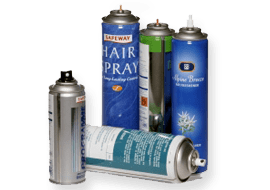Aerosol cans are among the most recycled packaging in South Africa, namely metal cans. Collect-A-Can has announced that the 2011recovery rate for used beverage cans was 72%. (This recovery rate provides the measure for the industry as a whole. When all metal cans are considered, the recovery rate is believed to be much more.) The numbers have grown significantly since the start of Collect-A-Can in 1993.
The company pays for cans and provides tens of thousands of southern Africans with the opportunity to earn a living, most of whom are unemployed. On receipt, cans are crushed into bales at Collect-A-Can’s various branches, before being dispatched to steel mills where they are melted to produce steel. Used metal cans are 100% recyclable and can be recycled over and over again without degradation. A vast amount of both energy and resources are saved in the process. The Aerosol Manufacturers’ Association also reports that there is a big initiative in the industry to drive sustainability and recycling. Nampak DivFood is Africa’s largest manufacturer of aerosol cans.Nampak DivFood is also a co-sponsor of the Green Expo taking place from 23 to 25 November in Cape Town after the Johannesburg stint at the end of September. Once again, the company is sharing the CAN DO! platform with Collect-A-Can and Nampak Bevcan. To further highlight the recycling capability and sustainability of metal cans, the group has invited Atit Bhatia, President of the InternationalCanvironment Week, to speak. Initiated by Hindustan Tinworks, India’s largest manufacturer of food and beverage cans, International Canvironment Week is a global campaign aimed at promoting metal packaging. In 2011, South Africa was the first country in Africa to get involved.
There are many similarities between India and South Africa from a recycling and packaging perspective, which Atit will profile during the Green Expo programme. On the CAN DO! stage, Nick Tselentis, the Executive Director of the Aerosol Manufacturers’ Association, will show how and why aerosols are recyclable. At the same time, Nampak DivFood is constantly reviewing opportunities for improved lightweighting and sustainability performance. The first stage of this is already complete and customers have had the benefits of lightweighting on 45mm and 52mm diameter cans. Nampak’s research and development facility in Cape Town is at the cutting edge of science and technology in this regard. Once a lighter steel has been fully tested and approved for the 57mm and 65mm diameters, consumers and industry stakeholders can look forward to conserving significant resources and making a real difference for the future.






